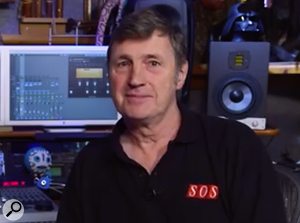It’s always interesting to speculate on what the future might hold for music technology, so maybe it’s time to wipe the dust off the old crystal ball...
 Some things can be predicted without any special clairvoyant skills, such as the increase in software companies adopting the monthly rental model, though I have to admit that as somebody who makes only small returns from their recorded music, it doesn’t really appeal to me. It’s all very well somebody offering you an ‘all you can eat’ buffet of their plug-ins for £$20 a month or whatever, but you can soon find yourself spending in excess of £$100 a month to bag all your favourites, only to find that many of the other plug-ins in the bundles go unused. Maybe this works for professionals who make a living out of music, but for me it would take around a year’s worth of Spotify income to rent one suite of plug-ins for one month. There’s also a move towards putting everything in the cloud, and those in the know predict that before too long we’ll just have dumb terminals at home and all the computing power will reside on some kind of giant cumulonimbus ‘megaputer’.
Some things can be predicted without any special clairvoyant skills, such as the increase in software companies adopting the monthly rental model, though I have to admit that as somebody who makes only small returns from their recorded music, it doesn’t really appeal to me. It’s all very well somebody offering you an ‘all you can eat’ buffet of their plug-ins for £$20 a month or whatever, but you can soon find yourself spending in excess of £$100 a month to bag all your favourites, only to find that many of the other plug-ins in the bundles go unused. Maybe this works for professionals who make a living out of music, but for me it would take around a year’s worth of Spotify income to rent one suite of plug-ins for one month. There’s also a move towards putting everything in the cloud, and those in the know predict that before too long we’ll just have dumb terminals at home and all the computing power will reside on some kind of giant cumulonimbus ‘megaputer’.
Logic 10.4 has already taken further steps to liberate us from the tyranny of the click track, and it can only be a good thing that efforts continue in that direction. Having the computer follow the musician rather than the musician follow the computer feels much more natural to me. Maybe we’ll even see software drummers that ‘listen’ to our recorded performances and respond in the same intuitive way as real drummers. That certainly seems possible given the rise of Artificial Intelligence, which at the moment seems to be balancing out the rise in Genuine Stupidity that’s becoming so prevalent.
AI is sure to play a greater role in the way we make music in the future, and while it is already possible to create algorithms that split out chordal parts into, for example, fully arranged string parts in various styles, I’m sure AI is the way to do this properly. Essentially the software would ask itself, ‘Now what would Elgar do’? AI could also help out in the pitch-correction arena by making fully automatic pitch-correction sound more natural and perhaps even offer different styles of pitch transition based on the way some established artists sing. And I’m still waiting for a plug-in that remodels naff drum sounds rather than simply replacing them.
OK, I admit it, I can’t see much further beyond the horizon than the next person, but every time I think we already have all the tools we’ll ever need to make good music, somebody comes along with something else that I can’t live without.
